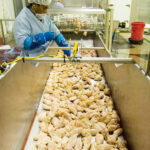A campaign group has claimed some chicken meat sold by Lidl is contaminated with antibiotic-resistant bacteria and other pathogens. A total of 142 own-brand products from 22 Lidl stores in Germany, Italy, Spain, Great Britain, and Poland were tested by a laboratory in Germany. The products need to be cooked… Continue Reading Foodborne Pathogens, World, Albert Schweitzer Foundation, animal welfare, antibiotic reistance, Campylobacter, chicken, Lidl, Listeria, Open Cages, Salmonella Food Safety News
A campaign group has claimed some chicken meat sold by Lidl is contaminated with antibiotic-resistant bacteria and other pathogens.
A total of 142 own-brand products from 22 Lidl stores in Germany, Italy, Spain, Great Britain, and Poland were tested by a laboratory in Germany.
The products need to be cooked before consumption and should not be consumed raw. Previous advice from the Food Standards Agency (FSA) was that the risk of getting infected through eating or preparing contaminated meat remains low as long as people follow good hygiene and cooking practices.
The study was commissioned by the Albert Schweitzer Foundation, Animal Welfare Observatory, Essere Animali, Open Cages, the Fundacja Alberta Schweitzera, and Otwarte Klatki. The Albert Schweitzer Foundation campaigns against factory farming and for a vegan lifestyle.
European results
All samples were purchased between December 2023 and March 2024 and the cold chain was monitored and maintained, according to the Albert Schweitzer Foundation. In each of Germany, Spain, and Italy, 24 products were tested. In the UK, 40 were tested and 30 in Poland.
Salmonella was found in 9 percent of the samples. Two of these came from Poland and 11 from Italy. No information was shared on the level of contamination or at what stage of a products’ shelf life tests were conducted.
Listeria was detected in a third of all samples and six from Germany. In Italy, 13 samples were positive. Campylobacter was found in every second sample from Germany. In Spain, 20 samples were positive.
The lab tested meat samples for ESBL-producing pathogens and for methicillin-resistant Staphylococcus aureus (MRSA). A third of samples from Germany were contaminated. The figure for Spanish samples was 71 percent and 58 percent for English samples.
“The results of the microbiological examination of Lidl meat should wake us all up. Lidl must address the cause of the high number of antibiotic-resistant and other pathogens on meat and ensure that its suppliers provide better chicken farming across the board,” said Mahi Klosterhalfen, president of the Albert Schweitzer Foundation.
UK findings and Lidl response
Animal welfare charity Open Cages presented the UK results, claiming a dozen products were positive for Listeria but Salmonella and Campylobacter were not found.
“We work closely with our suppliers and a multitude of industry partners, aligning our policies with the Responsible Use of Medicines in Agriculture Alliance (RUMA) and the Food Industry Initiative on Antimicrobials to ensure the responsible and RUMA recommended use of antibiotics, while ensuring animal welfare remains a priority,” said a statement from Lidl.
“Our own testing shows that in the last 12 months there have been no micro-related deviations outside of legal levels, and no concerns have been raised to us by any regulatory bodies on this topic. It’s therefore evident and extremely concerning that Open Cages continues to disseminate false and inaccurate information, with the apparent aim of garnering media attention and both scaremongering and misleading the public. If Open Cages has any real and verified concerns regarding the presence of pathogens in fresh British chicken, we encourage it to work with verified sources and share its complete findings with either ourselves or with the FSA for further investigation.”
(To sign up for a free subscription to Food Safety News, click here.)







